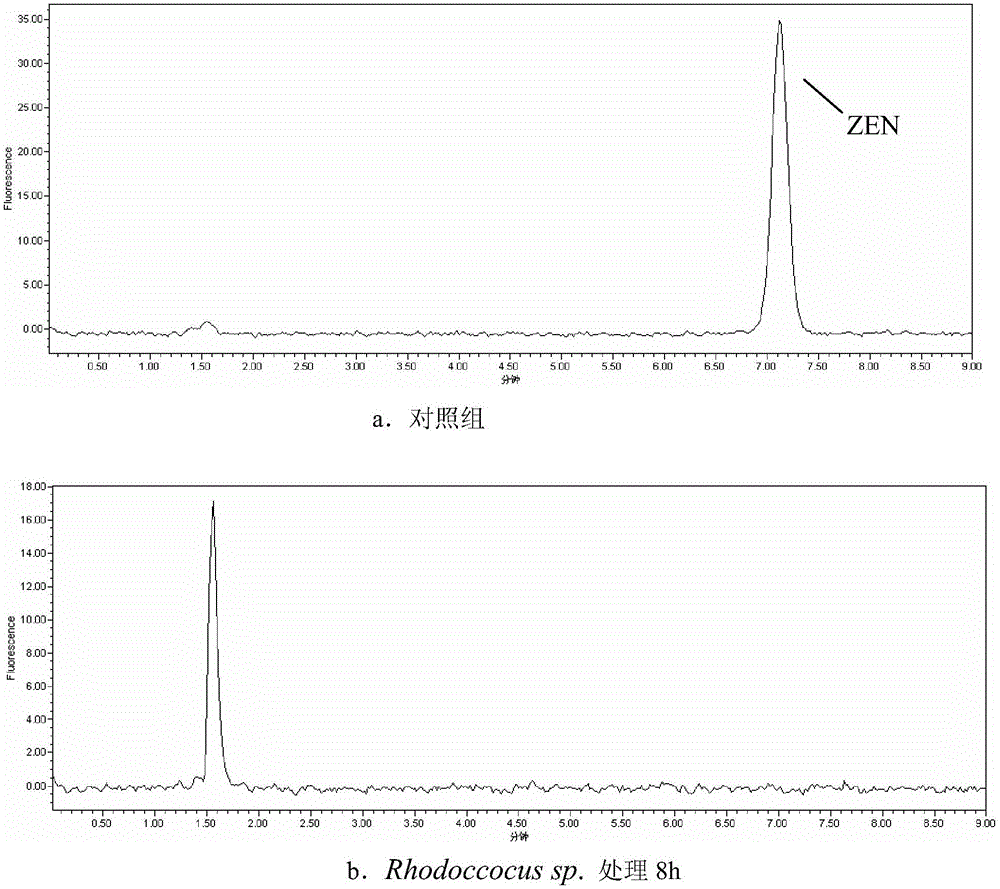Rhodococcus sp. and application of rhodococcus sp. to zearalenone degradation
A technology of Rhodococcus and mutant strains is applied to a strain of Rhodococcus and its application field of degrading zearalenone, which can solve the problems of low ZEN degradation rate and weak degradation ability, and achieve fast and efficient detoxification ability, easy Operation, the effect of solving the problem of toxin contamination
- Summary
- Abstract
- Description
- Claims
- Application Information
AI Technical Summary
Problems solved by technology
Method used
Image
Examples
Embodiment 1
[0028] Example 1 Rhodococcus Rhodococus sp. acquisition and identification
[0029] Soil samples were collected from the corn cultivation layer in the high-incidence area of scab in Shangzhai Village, Linzhou, Henan Province, and the 96-well deep-well plate was used as the culture carrier, and the micro-enrichment culture method was adopted to first prepare the sample into a bacterial suspension in sterile water , inoculated in MM liquid medium (NH 4 NO 3 1g / L, (NH 4 ) 2 SO 4 0.5g / L, MgSO 4 ·7H 2 O0.41g / L, KH 2 PO 4 0.5g / L, K 2 HPO 4 1.5g / L, NaCl0.5g / L, FeSO 4 ·7H 2 (00.037g / L, pH7.0-7.2, sterilized at 121°C for 30min), the final concentration of ZEN in the medium was 25 μg / ml, and transplanted with 10% inoculum after culturing for 7 days, the concentration of ZEN in the medium was constant . After 5 consecutive transplants, the ZEN content was detected by HPLC, and the MM medium containing the same ZEN concentration without inoculation was used as a negative co...
Embodiment 2
[0036] Example 2 Rhodoccocus sp. Degradation effect on ZEN in MM liquid medium
[0037] Activate the Rhodoccocus sp. stored at -80°C on LB agar medium, culture at 30°C, inoculate a single colony in LB liquid medium, culture at 30°C, 200 rpm for 24 hours; centrifuge at 4000 rpm for 10 minutes, discard For the supernatant, resuspend the bacteria with an equal volume of sterile water, discard the supernatant after repeating twice, add an equal volume of MM medium, and inoculate 10% of the inoculum in the MM medium containing 25 μg / ml ZEN, and at the same time Take the MM medium containing the same concentration of ZEN without inoculation as the blank negative control, incubate at 30°C and 200 rpm for 12 hours, take a sample, add an equal volume of methanol, mix well, let stand for 1 hour, take the mixed solution at 14000 rpm After centrifugation for 10 min, the supernatant was taken for HPLC detection. The detection conditions were partially improved with reference to GB / T23504-...
Embodiment 3
[0039] Embodiment 3Rhodoccocus sp. Preparation of liquid biological detoxification agent
[0040] Components and ratio of seed medium: 1% tryptone, 0.5% yeast extract, 1.0% NaCl, pH7.0-7.2. Fermentation medium components and ratio: yeast extract 0.8%, casein peptone 0.4%, glucose 1.0%, (NH 4 ) 2 SO 4 0.1%, K 2 HPO 4 0.2%, MgSO 40.02%, NaCl0.01%, pH7.0-7.2.
[0041] (1) Strain activation: inoculate the Rhodoccocussp. cryopreservation tube with the preservation number CGMCCNo.7186 on the solid medium, culture it at 30°C for 24-36 hours, measure its toxin degradation performance, and then inoculate it on the slant of the test tube on standby.
[0042] (2) Seed culture: pick bacteria from the slant medium and insert them into the seed medium, and cultivate them to the logarithmic phase at 30°C to obtain first-class seeds; then, use a 500-liter seed tank to feed the seed medium Amount of 350 liters, 121 DEG C of high-pressure damp heat sterilization after feeding, cooling t...
PUM
 Login to View More
Login to View More Abstract
Description
Claims
Application Information
 Login to View More
Login to View More - Generate Ideas
- Intellectual Property
- Life Sciences
- Materials
- Tech Scout
- Unparalleled Data Quality
- Higher Quality Content
- 60% Fewer Hallucinations
Browse by: Latest US Patents, China's latest patents, Technical Efficacy Thesaurus, Application Domain, Technology Topic, Popular Technical Reports.
© 2025 PatSnap. All rights reserved.Legal|Privacy policy|Modern Slavery Act Transparency Statement|Sitemap|About US| Contact US: help@patsnap.com



